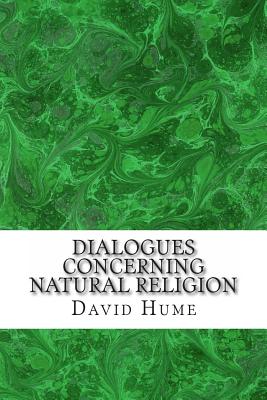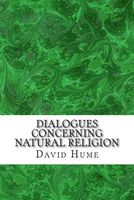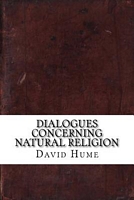- Welcome to FictionDB, Guest
- | My Account
- | Help

Dialogues Concerning Natural Religion — David Hume

David Hume, the 18th century philosopher, economist, and historian, uses a lively Socratic discussion by three characters to explore the nature of religion and God, particularly whether and how one can know that God exists. Having been accused of heresy during his lifetime, Hume knew not to publish this book until after his death, so he bequeathed the manuscript, a few days before his death, to his printer, but if the printer didn't publish it within 2 years, the manuscript would go to Hume's nephew, also named David Hume, which it did and the nephew did publish it. One of the oldest and most popular arguments for the existence of God is the design argument, that order and "purpose" in the world must be proof of a divine origin: Where one sees a watch, one may infer the existence of the watchmaker. Here Philo, Cleanthes, and Demea volley their arguments back and forth. Cleanthes advocates for the existence of God based upon observed design in the world, Philo counters that argument, and Demea represents rigid orthodoxy. The dialogues continue for a total of 12 parts, exploring many ideas such as that there may be more than one supreme God, that our universe may have been spawned without a creator from an older one as a plant procreates by spreading its seeds, and other questions about the natural world and the concept of the Deity. Scholars disagree regarding which character most closely represents Hume's own voice in the dialogues, but most say that Philo speaks for Hume. The Dialogues and Hume's other philosophical writings about the nature of "knowing" would lead one to a conclusion that Hume was an agnostic, not an atheist. In the introduction, as a letter from Pamphilus to Hermippus, Hume explains his choice of the dialogue as the style for this presentation: "Any question of philosophy ... which is so OBSCURE and UNCERTAIN, that human reason can reach no fixed determination with regard to it; if it should be treated at all, seems to lead us naturally into the style of dialogue and conversation. Reasonable men may be allowed to differ, where no one can reasonably be positive. Opposite sentiments, even without any decision, afford an agreeable amusement; and if the subject be curious and interesting, the book carries us, in a manner, into company; and unites the two greatest and purest pleasures of human life, study and society." Hume attended the University of Edinburgh at the unusually early age of twelve (possibly as young as ten) at a time when fourteen was normal. At first he considered a career in law, but came to have, in his words, "an insurmountable aversion to everything but the pursuits of Philosophy and general Learning; and while my family] fanceyed I was poring over Voet and Vinnius, Cicero and Virgil were the Authors which I was secretly devouring." He had little respect for the professors of his time, telling a friend in 1735, "there is nothing to be learnt from a Professor, which is not to be met with in Books." He found employment at various times as a merchant's clerk and as a tutor, while continuing to study philosophy and write his works, the first of which, A Treatise of Human Nature, he completed at age 26. It was not well received by critics in Great Britain. Hume wrote on the subjects of philosophy (especially on epistemology - how one knows something to be true), religion, history, and politics. Through his discussions on politics, Hume developed many ideas that are prevalent in the field of economics today. This includes ideas on private property, inflation, and foreign trade. Referring to Hume's essay "Of the Balance of Trade," Paul Krugman (a Nobel-prize-winning economist) has remarked ..". David Hume created what I consider the first true economic model."
Genres
Click on any of the links above to see more books like this one.



